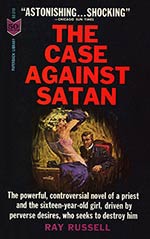
![]() charlesdee
charlesdee
1/10/2016
![]()
I will save you a trip to Google. William Peter Blatty published The Exorcist in 1971. That puts Ray Russell's novel out of the chute nine years before Blatty's demonic extravaganza. I don't know that Blatty ever acknowledged Russell as an influence, but it is also wrong to view Russell's short novel as merely a tame precursor to Blatty's bestseller. Blatty based his novel on a 1949 case of supposed possession in St Louis and used the storyline to create a pyrotechnic combat of good versus a very real supernatural evil. Although both authors draw from the same playbook when it comes to the details of possession and the rite of exorcism, Russell's work remains much more ambiguous on the topic supernatural versus psychological causes.
Blatty placed his narrative on a world stage. Russell keeps things close to home. Susan Garth, the teenage victim, and her family are part of a close-knit Catholic community. He provides clues to direct readers into considerations of possible abuse or the most severe symptoms of repressed pubescent sexuality in a deeply conservative religious environment. His prose is restrained compared to what Blatty later trained us to expect in these situations. Susan does strip naked in front of her elderly parish priest, but Russell never details the obscenities she screams during the ritual. I think the word "shit" is used once. Russell focuses on the very real suffering all the participants undergo during the ordeal.
Ray Russell was executive editor of Playboy magazine in the 1960's and oversaw the publication's emergence as a venue for innovative fiction. He wrote a few other horror tales, now collected by Penguin in Haunted Castles: The Complete Gothic Stories. He gave us "Sardonicus," the source of the William Castle film Mr. Sardonicus, and so there is many a middle-aged American today who can thank Mr. Russell for one of the single greatest scream moments of their childhood. Russell is worth reading for anyone interested in the development of what became the boom in American horror writing that began just a few years after The Case Against Satan. For any reader, the novel is an enjoyable way to spend a few hours with an accomplished storyteller.